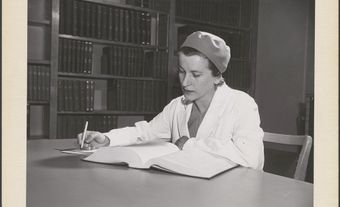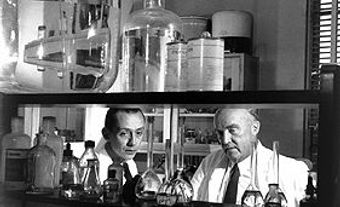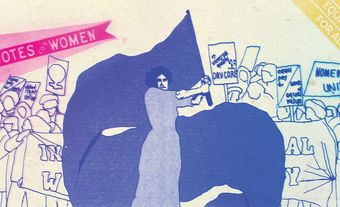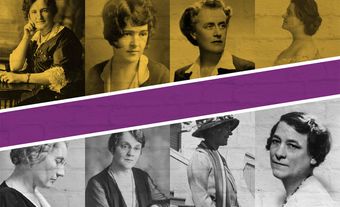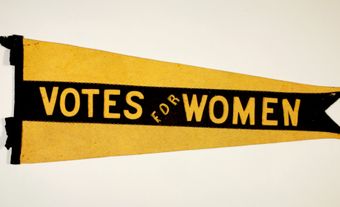Leonora Howard King, physician, missionary (born 17 March 1851 in Lansdowne, Canada West; died 30 June 1925 in Beidaihe, Qinhuangdao, China). King was a pioneering Canadian physician and medical missionary, widely recognized as the first Canadian doctor to work in China. A recipient of the Order of the Double Dragon, King was likely the very first Western woman to become a Qing Dynasty mandarin.

Early Life & Education
Leonora Annetta Howard was born in Lansdowne, Canada West in 1851 and grew up in Farmersville (today Athens, Ontario). She was the daughter of a farmer, Peter Gilton Howard, and Dorothy Carter Howard. Leonora’s older brother, Eugene, would serve several terms as a Member of Parliament. Her paternal grandfather, Peter Howard, was a doctor, as were two of his brothers. She was educated in the nearby community of Soperton and then attended a teacher’s school in Syracuse, New York. Teaching was a traditional occupation for young middle-class women of the 19th century, and Leonora Howard taught in eastern Ontario for a few years after graduation. She was responsible for schools throughout Leeds County, which at the time extended some 160 km east to Vankleek Hill, Ontario.
Medical Training
Leonora Howard, however, wanted to be a physician. Though women were not explicitly barred from working as physicians, few were admitted to medical schools or found employment in that period. The Royal College of Physicians and Surgeons in Kingston, for example, did not accept women for medical training. In 1872, however, Howard was accepted at the University of Michigan’s medical school. Her Uncle Alpheus, who practiced in Grand Rapids, Michigan, was both her tutor and sponsor.
Howard graduated with honours from the University of Michigan’s medical school in 1876. Yet she could not practice medicine in Canada: doctors holding medical degrees from American institutions were required to pass a Canadian medical course, and women were barred from medical schools in Canada at the time.
Career in China
In 1875, Leonora Howard joined the Woman’s Foreign Missionary Society of the American Methodist Episcopal Church (WFMS). Scholars believe she was influenced to join the missionary movement in China by Adelaide Galliland, a member of Howard’s Methodist church in Soperton and the first Canadian woman to live in China.
A year after graduating medical school, the WFMS sent Dr. Howard to China, where she began living and working in Beijing. She first assisted Dr. Lucinda L. Combs, the first Western-trained doctor to practice in China. Dr. Howard later took over the daily operations of what was then called Peking Hospital.
In 1879, Howard was sent to Tianjin (then Tien-tsin) at the request of the Viceroy of Zhili, Li Hongzhang (Li Hung-chang), to care for his ailing wife. When Lady Li recovered, she asked Howard to stay in Tianjin to continue practicing medicine. This was a considerable honour; Lady Li’s influence was such that the wealthy and powerful citizens of Zhili helped fund her medical practice in a local temple. Half of the temple was a women and children’s ward run by Howard, while in the other half, Dr. Kenneth Mackenzie of the London Missionary Society treated men and boys.
In 1881, Howard opened the Isabella Fisher Hospital for Women and Children in Tianjin, which was sponsored by the WFMS and named after the mother of their primary benefactor. Leonora was the hospital’s founder and first manager. This shifted the focus of the WFMS’s missionary and medical work in Northern China from Beijing to Tianjin.
On 21 August 1884, Howard married the widowed Reverend Alexander King of the London Missionary Society in Tianjin. At the time, women missionaries were expected to resign from their activities to join with those of their husbands. Though Leonora Howard King did resign from the WFMS, she never formally joined the London Missionary Society. By this time, she was almost exclusively working for the Chinese government.
In 1885, Howard King opened a medical school for Chinese women who had been educated at mission schools, and the following year Lady Li built her a hospital. In 1891, Howard King and her husband took their first furlough, traveling to Canada and Great Britain. During the First Sino-Japanese War of 1894–95, Howard King made her hospitals available exclusively to wounded soldiers. This act cemented her reputation and bought her considerable prestige in China. Howard King continued her medical work and demonstrated her commitment to China once again during the Boxer Rebellion of 1900. When most other Westerners returned home or fled to Japan, she remained in Tianjin and continued providing medical support to the local population.
In 1908, Howard King opened the Government Medical School for Women in Tianjin, the first such facility in China to teach women to become doctors and nurses. In 1915, a new Isabella Fisher Hospital was opened, and a room was named for Howard King. Around 1917, she and her husband retired and adopted Agnes Clarke, whose parents had died in an uprising. The Kings returned to Canada in 1923 to visit her family and to find a suitable home for their retirement. Howard King died of influenza in China in 1925 as the couple were preparing to leave China for good. Her gravesite is unknown.
Honours
For her work treating Chinese soldiers wounded during the First Sino-Japanese War of 1894–95, Leonora Howard King was decorated by the Chinese government with the Order of the Double Dragon. This made her the first Western woman to become a mandarin (the name for Qing Dynasty government officials).
On 18 May 2000, Howard King was posthumously inducted into the Canadian Medical Hall of Fame. In 2004, she was inducted into the International Women in Medicine Hall of Fame of the American Medical Women's Association.

 Share on Facebook
Share on Facebook Share on X
Share on X Share by Email
Share by Email Share on Google Classroom
Share on Google Classroom
